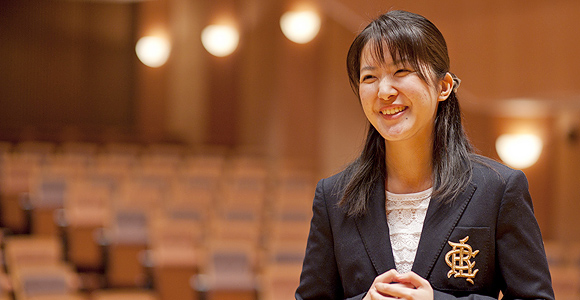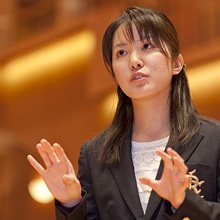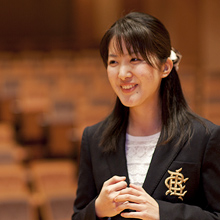Yurie Makino

The diversity of SDM gave me
new "impetus"
Yurie Makino
(entered spring, 2009)
Graduated from the Department of System Design Engineering at Keio University Faculty of Science and Technology in March 2009
Design of social systems that cause people to engage in eco-behaviors without thinking about it
My research theme is "the design of social systems that cause people to engage in eco-behaviors without thinking about it." My original impetus for taking up this theme came from issues that I identified while writing my graduation thesis as an undergraduate. In the Faculty of Science and Technology, I established several scenarios concerning CO2 emissions from homes and estimated total output through 2050. One of these scenarios posited extremely energy-conservative behavior on the part of consumers. What my estimates indicated was that a combination of energy-conservation technology and energy-conservative behavior could achieve the targets that the government has set. However, I was not satisfied with those findings. There may be a scenario in which goals are achieved, but it is meaningless if people do not act accordingly. I told my undergraduate advisor that I wanted to study ways to create eco-behaviors among people. I was informed that I could not do that topic because of the difficulties in finding test subjects.
 SDM didn't say that. I met Professor Takano in my initial contacts and Professor Maeno when choosing a laboratory. They suggested "designing social systems that would cause people to engage in eco-behaviors without thinking about it." That is where my research at SDM began. This caused me to study the psychology of people's wants and desires, something that would have been inconceivable while I was in the Faculty of Science and Technology. My research at SDM did not stop with psychology, however. I also had to think about the design of social systems. I was only able to arrive at my final answer about how to design social systems in ways that human desires automatically lead to eco-behavior because I had studied the concepts of systems engineering in the core classwork.
SDM didn't say that. I met Professor Takano in my initial contacts and Professor Maeno when choosing a laboratory. They suggested "designing social systems that would cause people to engage in eco-behaviors without thinking about it." That is where my research at SDM began. This caused me to study the psychology of people's wants and desires, something that would have been inconceivable while I was in the Faculty of Science and Technology. My research at SDM did not stop with psychology, however. I also had to think about the design of social systems. I was only able to arrive at my final answer about how to design social systems in ways that human desires automatically lead to eco-behavior because I had studied the concepts of systems engineering in the core classwork.
Ability to view things from multiple perspectives
This may sound vague, but at SDM we learn how to view various problems from multiple perspectives. We often talk about "seeing the trees, but also the forest," and this would be the "forest" part of that phrase. I spent four years in the Faculty of Science and Technology and my undergraduate experiments and classes gave me at least some ability to "see trees," as is the case for every student. "Seeing the forest," however, was a skill that I learned almost entirely at SDM. I think it was possible because of the many discussions that I had with teachers and students who come from so many different backgrounds and areas of interest.
I will be entering the workforce for the first time in April. Japan has many social problems that must be addressed, and in my work I want to better society by bringing broad perspectives to challenges and always asking what it is that stakeholders desire and how we can create a "win" for everyone.
Projects that impressed me
Farm tours in the Agricultural Laboratory
I was chosen to lead the retreat, and I used techniques I learned in project management classes to involve my classmates and junior students in the preparations. In the course of the tour, we were able to see for ourselves the problems that confront Japanese farms in Hokkaido, Japan's breadbasket. Viewing social problems firsthand, rather than just talking about them in the classroom, made a deep impression on me.
The Strategic Social Education System Laboratory
The goal of the Strategic Social Education System Laboratory is to create human resources development systems that train people quickly and consistently. In 2010, a returning student in the laboratory took the lead in teaching us about human systems design techniques. One of the things that he emphasized was how to control the temptation to go for quick, ad hoc solutions in research, something to which new graduates like myself are often prone. These research activities eventually resulted in a presentation and award at the Kanto preliminary review in the "Shakaijin Kisoryoku (basic business skills) Grand Prix" sponsored by the Ministry of Economy, Trade and Industry (November 2011).
The diversity of SDM gave me new "impetus"
 Discussions with returning students and faculty members, who have such disparate backgrounds and areas of interest, have been an impetus for me in my studies and research. Ever since elementary school, I have wanted to be involved in the solution of environmental problems, but I have gone beyond that now. I want to tackle the many social issues that confront Japan, not just environmental conservation, but also the pursuit of happiness for all. This has been a revolutionary change in my thinking. The diversity of SDM has taught me the importance of not just focusing on a single issue, but instead viewing multiple, possibly disconnected problems from multiple perspectives.
Discussions with returning students and faculty members, who have such disparate backgrounds and areas of interest, have been an impetus for me in my studies and research. Ever since elementary school, I have wanted to be involved in the solution of environmental problems, but I have gone beyond that now. I want to tackle the many social issues that confront Japan, not just environmental conservation, but also the pursuit of happiness for all. This has been a revolutionary change in my thinking. The diversity of SDM has taught me the importance of not just focusing on a single issue, but instead viewing multiple, possibly disconnected problems from multiple perspectives.

